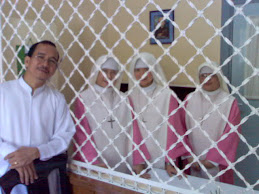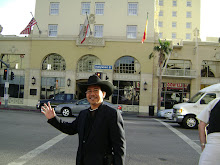There is an interesting development going on in Philippine society these days. The latest political developments may have actually inspired this direction. Our elected Congressmen of the House of Representatives have last week changed the house rules, spending two sleepless nights to ensure that they could lay the ground for Congress becoming a Constituent Assembly sans the Senate. This however was met with stiff opposition from a wide sector of society. People felt that the congressmen and congresswomen were aggrandizing the power unto themselves by becoming an institution (Constituent Assembly or Con-Ass) authorized to change the Constitution of the Republic of the Philippines without the other half of the legislative branch, i.e., the Senate. There are other modes for charter change, the other two namely, Constitutional Convention (Con-con), and People's Initiative. The most salient point in the opposition was the manner by which the House of Representatives had done it, thereby giving many in the country the impression that the changes they may have wanted were to be railroaded without consideration for due process. While the congressmen and congresswomen of the House of Representatives may have everything to defend themselves for their actions, they seemed to heed popular disagreement by shelving their plans. But a prayer rally, originally intended to voice opposition to Charter change through Con-Ass-sans Senate took place yesterday at the Quirino Grandstand under the auspices of the Catholic Bishops Conference of the Philippines (CBCP). Newspapers today headlined the event, quoting the new word for Cha-Cha "Character Change" and no longer Charter Change. Character Change first before Charter Change.
The Church, when she speaks of Character Change, does not invent a new term, nor is she simply giving an ideal. We have in the Catholic Church models by which we can follow and be guided. St. Joseph, the Husband of Mary, and the foster father of the Lord is one model of character which we can learn from.
Character and its meanings
Before I go to St. Joseph's character which we can sum up here into three, namely intrapersonal integrity, interpersonal or social consciousness, and openness to the Divine, I would like to mention what we oftentimes think of with the word "character". One site mentions the following qualities very much in character, and identifies them as the 6 Pillars of Character: Trustworthiness, Respect, Responsibility, Fairness, Caring, and Citizenship. In fact, the same site links us to another site where a deeper discussion about these words is made.
Indeed, character seems very much connected with being ethical and moral in one's actions and being. And St. Joseph seems to be no stranger to this.
St. Joseph's intrapersonal intergrity
St. Joseph's intrapersonal integrity refers to his knowledge of and conviction about what is right and wrong, and choosing the right. As soon as he knew that Mary was pregnant before he had ever lived with her in marriage, he thought of divorcing her. Marrying her was something considered wrong in his time. (Even today, it still is.) It was wrong because it would provide a model which others could easily follow. Accepting Mary in marriage would be telling people that such situation was acceptable, thereby opening the flood gates for illegitimate children, premarital promiscuity, and even sexual irresponsibility in the sense of enjoying the pleasures of sex while running away from one's responsibility in case a child is conceived. By opting to divorce Mary, St. Joseph was actually communicating to himself and others his moral values.
St. Jsoeph's interpersonal or social consciousness
His interpersonal or social consciousness can be gleaned in his decision to consider divorcing Mary "quietly." Had the divorce been made public, Mary would have been at a loss. Women pregnant before the wedding by someone other than the one she is to marry were supposed to be dragged to the city gates and stoned to death. Had this happened, the Lord Jesus would not have survived. While St. Joseph may have considered social mores, she likewise considered the personal reality of Mary and the child in her womb. We can see St. Joseph being particularly considerate of these two persons' predicament. We can see his valuing life and capacity for sacrifice to protect life, the life of two human beings.
St. Joseph's openness to the Divine
The third is St. Joseph's openness to the Divine. This appears to be one angle of character wherein the Transcendent becomes veritable. Nowhere does it say or allude in Matthew that St. Joseph prayed over the matter. Yes, he may have ruminated about his plans and decisions. Consulting others may have contradicted his original plan to divorce her "quietly", since consultation means allowing a third party into his plan, thereby effectively making public the whole affair. However, Matthew provides us with a hint about what predominated St. Joseph's consciousness. The resolution to the problem through a dream suggests St. Joseph's being open to Divine intervention. Had this quality of his character not been mentioned or at least alluded to, Jesus would not have been born into our midst. We would not have had Emmanuel, God with us, around. The plan of God would not have materialized. The Incarnation would not have had taken place. But St. Joseph was open and docile. He fulfilled the plan of God as revealed to him in a dream.
If we are to track the road to Character Change, it is important to be persons of integrity: knowing and choosing what is right; social or interpersonal consciousness always considers the consequences of one's choices as basically related to others, thereby considering the best interests of the other in such a decision; while openness to the Divine simply refers the decision to let God come in and make a difference. I believe that if these three qualities were always to be in mind, character change should be possible. How I pray that we be always conscientious of what is morally right and choose it; how I beg the Lord to make us always think about the other who may be affected by our self-centered choices no matter how morally sound they may seem to be; and how I plead before God that we be not too humanistic as to edge God out from our considerations. It is God Who is Lord of all, knows the blueprint of our development, and holds our future. When we this takes place, Jesus' coming into our midst would not be long. He should easily feel welcome, as He may have felt so welcomed and protected by St. Joseph.
Monday, December 18, 2006
Subscribe to:
Post Comments (Atom)


No comments:
Post a Comment